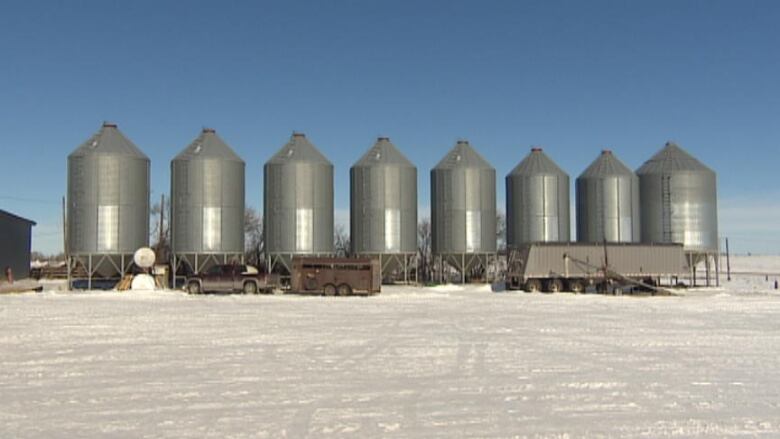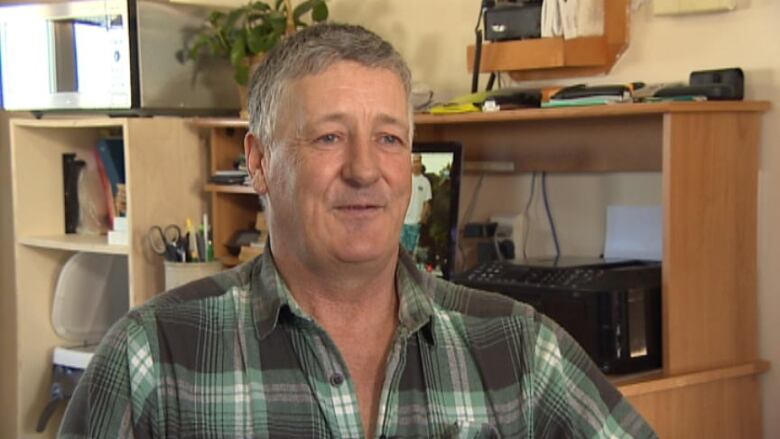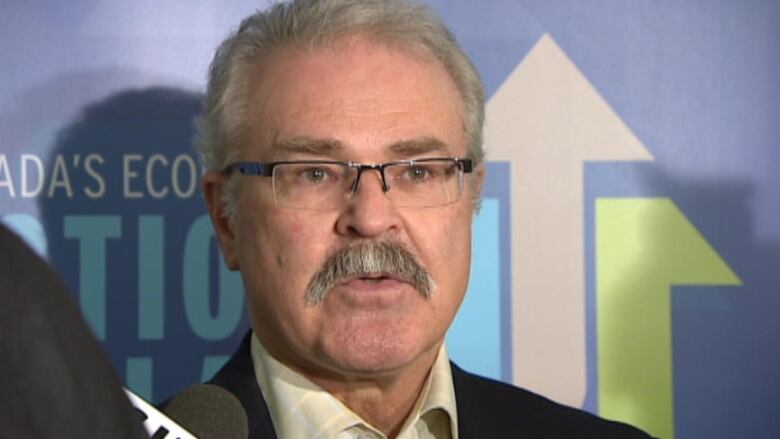Worry intensifies over delays in moving bumper crop
Rail companies say weather a factor in ability to respond to record crop

Concern about the ability of farmers to realize the dividends of a bumper crop because railways can not move grain to customers fast enough continue to mount.
"It makes it a little bit nerve-wracking," Roland Poirier, a farmer in southeastern Saskatchewan, told CBC News this week as he surveyed bins on his farm that are filled to the brim.
Poirier said until he can get his product to a customer, he can not capitalize on his bumper crop.
"When we have that grain in the bin, that grain is cash," Poirier said. "But the only way we can get our cash out of that grain, to be able to pay our bills, is it's got to move."

Poirier estimates he may be out $50,000 simply because grain prices have taken a tumble lately and he was not able to move his product before that happened.
Federal and provincial politicians have been pointing accusatory fingers at Canada's railways, suggesting the companies CN and CP have not done everything they can to meet the demand for rail cars.
If we're going to be a food power, if we're going to be an energy power, an export power, we have to make sure we have the logistics in this country, Saskatchewan Premier Brad Wall said Friday at a conference in Ottawa. Wall also said, earlier in the week, that it might be time to look at shipping grain south through the U.S. instead of east and west to Canadian ports.
They are a service industry that does not care much about service.- Agriculture Minister Gerry Ritz
In Regina, where federal and provincial officials announced a highways infrastructure project, federal Agriculture Minister Gerry Ritz repeated his criticism that the rail companies have fallen short and noted Walls suggestion may be a non-starter.
"The railways have arbitrarily decided they're not going to run cars that direction [south]," Ritz said. "That's part of the problem. They are a service industry that does not care much about service."

Officials from the railways have said winter weather has posed problems when it comes to adding capacity, noting they have to use shorter trains during cold weather to ensure brakes can be used properly.
Ritz said he wants to see some immediate solutions tothe existing backlog and did not rule out some form of federal action.
"It is a duopoly," Ritz said of the Canadian rail industry. "I think there's a role for government to play in incentives and disincentives to make sure that the service they offer is what customers are asking for."
Ritz said some meetings have already taken place, chaired by him, between grain companies and the railways. He said more meetings, with officials from the upper echelons of the companies, may yet be needed to achieve results.
"Everything's on the table, all options are being discussed," he added, when asked about what measures could be taken to improve the rail service.
Ritz said he has heard from farmers, and other industries, about the impact the rail bottleneck is having.
"If we can't supply the product, or get it to [buyers] ... in a timely way, they are going to look somewhere else," Ritz said, insisting he believes the railways are the key problem right now."It's a matter of the railways moving product seriously."
Railways respond
Spokesmen for CN and CP told CBC News Friday they are doing what they can to handle a very large crop in a very short amount of time.
CN is doing it level-best to move this 100-year grain crop to export position and world markets, that companys Mark Hallman said. This huge crop is close to 20 million tons more than an average crop, and it carries an export potential by rail that is at least 50 per cent larger than any other program in our history.
A CP official offered similar comments.
This is a complex supply chain issue involving not just the railways, but all participants, CP's Ed Greenberg said. CP continues to collaborate with all levels of government and stakeholders in the supply chain to ensure maximum efficiency is achieved in the transportation of grain.
With files from The Canadian Press and CBC's Bonnie Allen












_(720p).jpg)


 OFFICIAL HD MUSIC VIDEO.jpg)
.jpg)



























































































